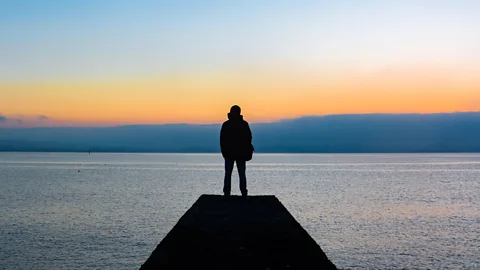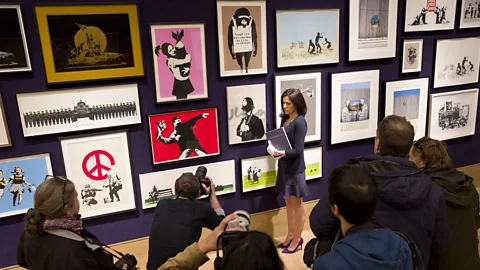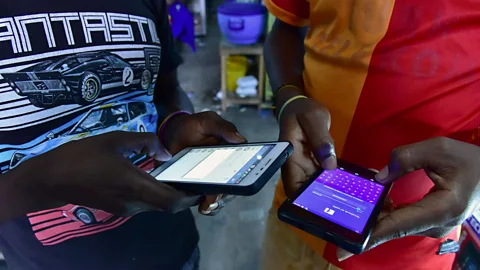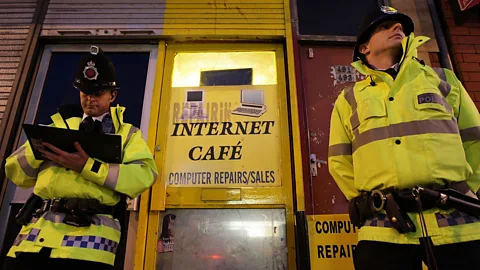The reasons you can't be anonymous anymore

In today’s hyper-connected world, it is becoming harder and harder for anyone to maintain their privacy. Is it time we just gave up on the idea altogether?
Grand Challenges
In this special series, Future Now takes a close look at the biggest, most important issues we face in the 21st Century.
For two months, we'll bring you insight from leading scientists, technologists, entrepreneurs and influencers to help you make sense of the challenges we face in today's rapidly evolving world.
Imagine walking into a roomful of strangers. Perhaps you’ve travelled to a new city. You don’t know anyone, and no one knows you. You’re free to do anything or go anywhere or talk to anyone. How do you feel?
Perhaps you feel free of the judgment and scrutiny from acquaintances or associates. Perhaps you feel energised that you can use this opportunity to experience life on your terms, at your own speed. But whatever your feelings would be, you would at least safely assume that you can enter this isolated situation without being monitored or tracked by a far-flung company or individual – right?
Wrong. What you’re experiencing as you walk into that room is anonymity: a sociocultural phenomenon that’s afforded privacy and freedom. But in the year 2017, it’s pretty much all but dead. It’s emerging as one of the major challenges of our age: how should we go about both ensuring national security and enhancing our lives through technology, whilst also maintaining a basic right to privacy that feels like it has existed since the beginning of human history?”
 Getty Images
Getty ImagesThe internet made us stop caring
Anonymity, which is Greek for “no name,” is a uniquely human psychological experience: it’s the idea that we all have identities to present to the world, but under certain circumstances, can switch the identity off and operate in total secrecy.
“We need a public self to navigate the social world of family, friends, peers and co-workers,” says John Suler, professor of psychology at Rider University in New Jersey, and author of The Psychology of Cyberspace. “But we also need a private self – an internal space where we can reflect on our own thoughts and feelings apart from outside influence, where we can just be with our own psyche. Our identity is formed by both. Without one or the other, our wellbeing can easily become disrupted.”
Being anonymous allows us to try new things or express ideas without being judged. In 2013, researchers at Carnegie Mellon University in Pennsylvania published a study in which they conducted in-depth interviews with dozens of internet users on four continents. One interviewee, for instance, created an anonymous online community for English learners to practise their language skills. Anonymity helped them better manage certain spheres of their lives. One participant said that he frequented message boards to help people solve technical problems, but sought to avoid unwanted commitments through the detached nature of the internet. Plus, being anonymous in an environment like the internet can help safeguard personal safety.
“Our results show that people from all walks of life had reason, at one time or another, to seek anonymity,” the researchers wrote of the 44 interviewees.
But according to a 2013 study from the Pew Research Center, while most internet users would like to remain anonymous, most don’t think it’s entirely possible. The study found that 59% of American internet users believe it is impossible to completely hide your identity online.
And while some people are taking basic steps to preserve anonymity, like deleting their browsing history, many users who say they value anonymity aren’t really walking the walk.
Earlier this year, a meta-analysis published in the Journal of Communication explored something called the “privacy paradox”: the idea that, while people value privacy, they do little in practice to preserve it. Think about it: when was the last time you actually read one of those many, lengthy privacy policy updates before clicking “I agree”? Our attitude toward privacy has become increasingly blasé.
One could even argue it’s even detrimental not to divulge at least some info. Career coaches worldwide trumpet the professional importance of having a fleshed-out public LinkedIn photo complete with full name, headshot, full work history and more.
Perhaps this is more of a cultural thawing toward previously uptight attitudes. I remember getting on the internet for the first time. It was the 1990s and on my father’s work computer. In those days, internet service providers went to great, paranoid lengths to discourage users from divulging even basic tidbits in their public profiles, like first name, city, even gender.
Today? Personal info flies freely and wildly across the web, often on our volition: Instagrammed selfies of ourselves and loved ones, complete with geotagged locations. Social media users engaging in political spats and horrible insults, despite the fact that the target of their harassment could click on their real names and real photos and see who they actually are.
“People tend to think of cyberspace as some kind of imaginary space without true boundaries, a space not to be taken too seriously – not subject to the same rules and standards as the ‘real’ world,” says Suler. In just the span of a few short years, people’s comfort level with the internet has risen to the point where information-sharing can be careless or reckless.
Call it privacy fatigue, but our increased interdependence on our smart devices and social media has given some of us a largely lazy attitude toward staying totally anonymous.
But what if you’re one of those people who eschews Facebook, has no social media presence, and goes to great lengths to leave a fleeting digital footprint? Sorry – your anonymity is at risk too.
Going off the grid is no fix
While skipping a Facebook profile is a good way to disconnect, there are still ways people can sleuth out your identity.
Paul Ohm, a law professor at Georgetown University in Washington, DC, says there’s “intentional anonymity” and “inferential anonymity”: the former being what we choose to keep close to the vest, and the latter referring to the data that a Google-savvy sleuth can “infer” from you online – that is, dig up loads of personal information about you using a single fact as a starting point.
 Getty Images
Getty Images“It’s become increasingly clear that it’s a losing game,” Ohm says on achieving total anonymity in 2017. “As long as someone knows something about you, they can probably find other things about you, and do it really successfully – more than they have in the past.”
If you’re a social media party pooper, that might mean old flames or long-lost classmates can’t track you down. But that doesn’t mean you’re anonymous from big entities, like corporations or the government.
“It’s much harder to be anonymous than it was 20 years ago, at least from the biggest companies and the government,” says Peter Swire, professor of law and ethics at Georgia Institute of Technology, and who served on US President Barack Obama’s Review Group on Intelligence and Communications Technology.
Advertisers track your internet habits across your devices – phone, tablet, laptop – to know where you habitually go, shop, and what kind of websites you visit, and there has been growing controversy about what internet companies should be allowed to track and sell to third parties.
Earlier this year, US President Donald Trump signed a law that repealed requirements for internet service providers to get permission from customers before gathering and sharing their personal data, like your web history and what apps you use.
Swire says we’re living in a “golden age of surveillance”: If you’re a person of interest in an investigation, looking up details like financial records, medical records, web history or call history is a breeze. And that hints at a larger, serious privacy concern in the age of cybersecurity breaches and digital services that keep your bank information and home addresses on record. It’s hard to go undetected these days.
What’s more? Ohm says we’re approaching the “next great frontier in advertising”: your location.
Sure, websites can tweak adverts to zero in on your interests based on the web searches you’ve made on the same device, or sites visited. But companies and advertisers are chasing technology and business deals that pinpoint your exact whereabouts in real-time for ‘personalised’ advertising. For example, an advert could flash on your mobile phone’s screen offering a coupon for a store you’re half a mile away from.
Unless you’re willing to live without the internet or without any smart device, it’s practically impossible to go completely off the grid.
“This is a bad time to be a spy,” Swire says. In other words, even for people whose job it is to be anonymous, it’s hard to be anonymous.
Still, there are plenty of instances in which anonymity is problematic, even dangerous. Is its demise actually a blessing for society?
 Getty Images
Getty ImagesIs the death of anonymity good?
Swire says that anonymity is a relatively new construct, and that the rise of cities gave rise to it. So, we’ve spent far more time living without it than living with it.
“Anonymity didn’t exist in small towns in the days of yore,” Swire says, where everybody knew everybody’s business. “To some extent, urban living created anonymity. The difference today is that even in a big city, each of us leaves breadcrumbs that an investigator can follow.”
Anonymity also has a dark side. In that same Carnegie Mellon study, 53% of interviewees admitted to malicious activities, like hacking or harassing other internet users, or engaging in “socially undesirable activities", like visiting sites that depicted violence or pornography, or downloading files illegally.
There may be signs that, while most people certainly want to keep sensitive information like bank accounts and medical records safe, others may not care about sacrificing true anonymity for a perceived greater good.
In a 2015 Pew study, Americans who were surveyed felt torn between maintaining privacy rights and ensuring national security: 56% surveyed said that they were more concerned that the government’s anti-terrorism policies hadn’t gone far enough to protect citizens, even if that meant sacrificing some civil liberties, like online privacy.
Meanwhile, YouGov, an internet market research firm, found in a survey last year that about nearly half of Britons contacted said that “more should be done to help the security forces combat terrorism, even if this means the privacy of ordinary people suffers.”
In any case, efforts to completely anonymise our activities are more or less futile: With the rise of the internet of things, more and more of the devices we use every day will require our personal information to function, and the more they’ll be integrated into our lives.
“There is this huge disconnect,” Ohm says. “Do we believe what people say when an interviewer asks them [about privacy], or do we believe their purchasing habits?”
Waning anonymity sounds inevitable. Still, if you do want to protect your privacy as best you can, the experts do offer a few tips.
 Getty Images
Getty ImagesBest practices you can use
Earlier this year, Pew found that most Americans don’t trust big institutions like the government or social media sites to protect their personal information – and yet, ironically, most Americans don’t follow best practices to protect their identities online.
What are some of those best practices? Keeping your passwords under lock and key, making a different one for each service, and making them hard to guess. But if you’re more concerned about your reputation than hackers, a little common sense goes a long way.
“Follow the front page test,” Swire suggests. “Don’t put comments down in texts or emails that would bother you if they were on the front page of the newspaper. I give that advice to intelligence agencies, and I give that advice to ordinary people.” Because while some people may not care about third parties or governments tracking their purchasing habits, people will definitely care more about being anonymous when it involves people they interact with on a daily basis.
“You might not care if a busy bureaucrat or internet company can access those gossipy emails, but you’d really care if your boss sees them instead,” Swire says. Using encrypted messaging apps like Signal and WhatsApp make your messages more private and more difficult to trace.
But if we’re going to reassign real cultural value to anonymity; to secure it as a basic right people are entitled to, it’s going to take a lot more than just individual action, and a lot more than encryption apps you can load up your phone with.
It’s going to take sweeping societal change. It’s going to take governments, advertisers, and tech corporations worldwide to agree on a baseline system of ethics. It’s not just about customers opting out of digital services – it’s about the choice to temporarily opt out of their public-facing identities, as well.
“All of us need to keep some private space where our deepest dreams and darkest fantasies are hidden away from other people – it gives us room to develop as humans, to try out different thoughts and different sides of ourselves,” says Swire. “That doesn’t change because of the internet.”
--
Bryan Lufkin is the editor of Future Now for BBC Future. Follow him on Twitter at @bryan_lufkin.
Join 800,000+ Future fans by liking us on Facebook, or follow us on Twitter.
If you liked this story, sign up for the weekly bbc.com features newsletter, called “If You Only Read 6 Things This Week”. A handpicked selection of stories from BBC Future, Earth, Culture, Capital, and Travel, delivered to your inbox every Friday.
